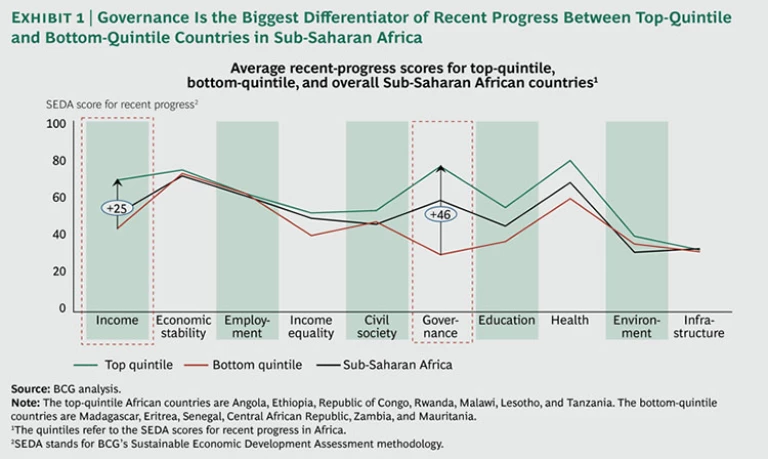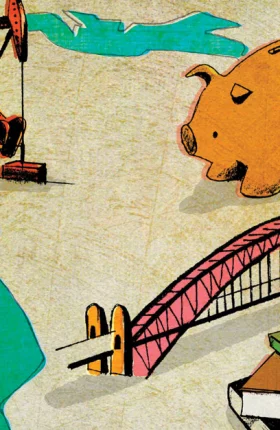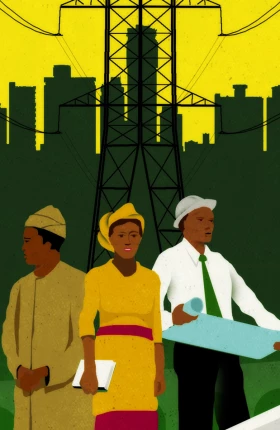The arguments over whether South Africa should still receive aid from Britain, following Justine Greening’s announcement that there would be no new DFID projects in South Africa, show how the global debate about the continent is shifting.
Africa was once viewed as a region that had stalled, making little or no progress. Now, the world is starting to notice the pace of economic change. Headlines on the theme of “Africa rising” are appearing more and more in international newspapers. But many doubt that this economic growth is actually improving living standards for the average African citizens.
Isn’t all the growth just fueled by resources? Aren’t the proceeds all flowing offshore? A deeper look at what’s happening reveals a more complex—and hopeful—story. And, more important, lessons about how to make sure economic growth and improvements in well-being go hand-in-hand.
The Boston Consulting Group has developed the “Sustainable Economic Development Assessment” (SEDA), which goes far beyond showing that people in wealthier countries have better lives than those living in poorer ones, and assesses a country’s general welfare by measuring the well-being of its population. It evaluates this across ten key dimensions: income, economic stability, employment, income equality, civil society, governance, education, health, environment, and infrastructure.
SEDA also looks both at well-being now (a country’s current level) and at how that well-being has developed over the last five years—and even at whether the country is taking the right steps to continue its success into the future by measuring key sustainability factors. In 2012, we used SEDA to take a global look at how effectively countries are turning wealth into well-being. New research by The Boston Consulting Group in conjunction with Tony Blair’s Africa Governance Initiative (AGI) has used SEDA to examine Sub-Saharan Africa in depth.
The study underscores some significant themes. First, it makes clear that there is great reason for optimism about the continent. While Sub-Saharan African nations still have levels of well-being far below those of wealthier countries, they are nevertheless among the nations making the biggest gains globally. Eight of the top 30 countries worldwide with the best recent progress in well-being scores are from Sub-Saharan Africa.
Second, when looking across the ten components of the measure, effective governance—even more than rising income—is the single largest differentiator between the Sub-Saharan African countries that improved their overall well-being scores the most and those that improved the least.
Geography Still Matters
One way to uncover patterns from SEDA’s findings is to group countries into different clusters based on similar traits: for example, landlocked countries, coastal countries, and resource-rich countries (15 percent or more of their GDP from mineral or oil wealth). When we did this, we found that resource-rich nations boast the highest per capita incomes, but coastal nations are better at translating their wealth into well-being.
Coastal countries have less in the way of natural resources but have always benefited from easier access to external markets and ideas. They are more exposed to international influences and commerce and more likely to develop robust, diverse economies. Interestingly, the SEDA scores for resource-rich countries are highly mixed, particularly in terms of current levels of well-being. These countries are increasingly defined by their ability to translate their resource wealth into well-being for the population at large.
So what makes the top performers so successful?
Let’s start with Ghana. Thanks to renewed political and social stability, this coastal country is establishing itself as a regional investment destination. It has worked hard to make itself more business-friendly with wide-ranging initiatives. The result: Ghana scores well above the coastal and African averages on our assessment of how attractive a country is as an investment center. Ghana’s investment in the development of a national fiber-optic backbone is mostly complete: 40 percent of Ghanaians have Internet access. Ghana now has the highest SEDA score for well-being of its population among the coastal group.
Then consider Angola. Remarkably, Angola is second in the world to Brazil as the country most successful in its recent progress in turning wealth into well-being. Of course, this progress has been made from a low base, but despite the country’s war-torn past, Angola’s recent progress is exceptional. Not only has it stabilized socially and politically after the civil war, it has also established stable and long-term partnerships between international oil companies and the state-owned oil company Sonangol. And more fundamentally, the government’s long-term plan Angola 2025 represents a broader economic development push—broken down into a series of five-year plans, specific milestones, and key performance indicators, it is a plan that has kept focused and stayed on track.
There is still huge room for improvement in Angola, but the country’s oil assets are now being leveraged to rebuild critical infrastructure. In 2002, life expectancy was just 46 years. By 2011, life expectancy had improved by five years, to 51. And the number of children enrolled in primary school has tripled since 2001 to reach 80 percent.
In our report, BCG and AGI have pulled together practical steps that countries can take to increase the likelihood of their reforms succeeding. The nations that have made significant progress demonstrated a focus on four key elements: strong political commitment, a disciplined prioritization of objectives, well-crafted policies that reflect local realities, and effective systems for delivering change.
It is way too soon to declare victory for Sub-Saharan Africa. But it is also clearly a continent that is moving in the right direction. It is no longer necessary to learn only from the developed world. There are now powerful lessons from countries within the African continent that are useful for their neighbors—and indeed leaders elsewhere in the world.
This commentary originally appeared in the FT’s beyondbrics blog on May 1, 2013.






